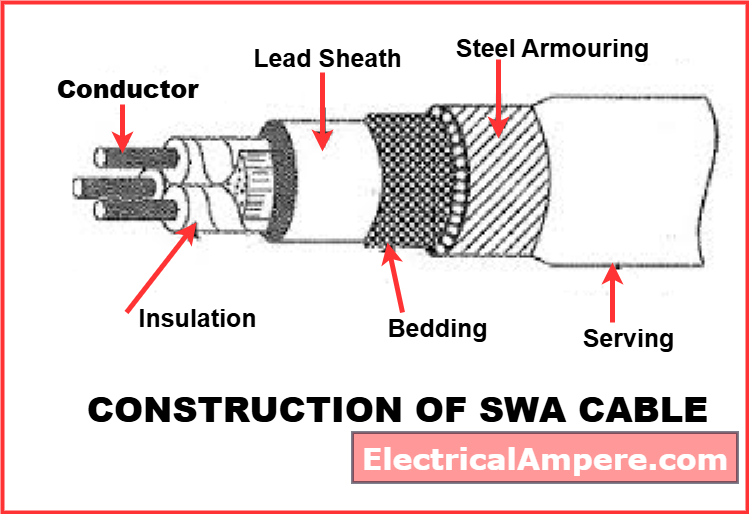SWA (Steel Wire Armoured) cable is a type of electrical power cable reinforced with a steel wire layer that protects its insulated core. This armour ensures high strength, durability, and safety, allowing the cable to withstand mechanical stress, moisture, and harsh environmental conditions. As a result, SWA cables are ideal for underground, outdoor, and industrial electrical installations.
This guide covers its meaning, construction, applications, advantages, comparison with STA cables, and a quick summary for easy reference.
What is SWA Cable?
SWA stands for Steel Wire Armoured. It is a type of power cable with a steel wire layer around the insulated conductor, designed to protect the cable from mechanical damage, moisture, and environmental stress. This armour provides high tensile strength, allowing the cable to be safely installed underground, outdoors, or in industrial setups without additional conduit protection.
Construction of SWA Cable
An SWA cable consists of the following layers:
- Conductor: Typically made of copper or aluminium.
- Insulation: PVC (Polyvinyl Chloride) or XLPE (Cross-linked Polyethylene) surrounds the conductor.
- Bedding: A protective inner layer to cushion the armour.
- Steel Wire Armour (SWA): The metallic layer provides mechanical protection.
- Outer Sheath: PVC or other material to protect against weather, moisture, and chemicals.

This robust construction ensures SWA cables can withstand harsh conditions in both indoor and outdoor electrical installations.
Applications of SWA Cable
SWA cables are highly versatile and commonly used for:
- Underground Power Distribution: Armour protects against soil pressure, digging, and rodents.
- Industrial Power Supply: Ideal for heavy machinery, motors, and control panels in factories or refineries.
- Outdoor Electrical Installations: Suitable for street lighting, garden wiring, and outdoor sockets.
- Renewable Energy Connections: Used in solar and wind power installations.
- Commercial and Domestic Wiring: Can serve as main supply lines or for specialized installations like garages and sheds.
Advantages of SWA Cable
- Mechanical Protection: Resistant to physical impact and stress.
- Durability: Long-lasting performance even in tough conditions.
- Safety: Reduces risk of short circuits and electrical faults.
- Versatility: Can be used in underground, outdoor, and industrial setups.
- Cost-Effective: Reduces the need for additional conduit protection.
STA Cable vs SWA Cable
Sometimes, people confuse STA cable with SWA cable. While both are armoured cables, there are key differences:
| Feature | SWA Cable (Steel Wire Armoured) | STA Cable (Steel Tape Armoured) |
| Armour Type | Steel wires | Steel tapes |
| Strength | Higher tensile strength | Moderate tensile strength |
| Flexibility | More flexible | Less flexible |
| Application | Underground, industrial, outdoor | Light to medium-duty cabling |
| Durability | High | Medium |
SWA cables are stronger and more flexible, making them ideal for heavy-duty and underground installations. STA cables are more suitable for light to medium-duty applications.
Quick Summary-Steel Wire Armoured Cable
- Full Form: SWA stands for Steel Wire Armoured.
- Meaning: A power cable reinforced with steel wire armour for safety and durability.
- Uses: Ideal for underground, industrial, and outdoor installations.
- Advantages: High strength, durability, and mechanical protection.
- Comparison: SWA is stronger and more flexible than STA cable.
Conclusion
Steel Wire Armoured (SWA) cables are durable, strong, and versatile, making them a reliable choice for industrial, outdoor, and underground electrical installations. By providing mechanical protection and environmental resistance, SWA cables ensure safe and long-lasting electricity transmission, making them ideal for domestic, commercial, and renewable energy projects.
Related Articles: